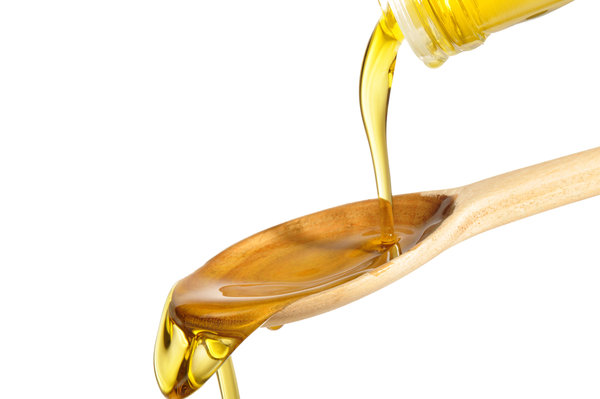Coconut oil

What is coconut oil?
Coconut oil is a vegetable fat that consists of around 90% saturated fatty acids. Most of these are so-called medium-chain fatty acids (MCT), which are easier for the body to metabolize than other fats. The most important MCTs in coconut oil include lauric acid, capric acid and caprylic acid.
Lauric acid makes up around 50% of coconut oil and has antibacterial, antiviral and antifungal (anti-fungal) effects. It can also inhibit inflammation, relieve pain and reduce fever. Capric acid and caprylic acid have similar effects, but are contained in smaller quantities in coconut oil.
Coconut oil also contains antioxidants that can strengthen the immune system and fight free radicals. Free radicals are harmful molecules that can cause cell damage. Antioxidants can therefore protect against ageing, cancer and other diseases.
How does coconut oil work for dogs?
Coconut oil can be used both externally and internally in dogs. Depending on the area of application, it has various benefits for the health and well-being of the dog.
Coconut oil for coat care
Coconut oil can care for a dog's coat by moisturizing it, reducing dandruff and relieving itching. It also gives the coat a beautiful shine and a pleasant scent. To use coconut oil for coat care, you can warm a small amount in your hands and gently massage or brush it into the coat. You can use the coconut oil one to three times a week as required.
Coconut oil against parasites
Coconut oil can also serve as natural protection against parasites such as ticks, fleas and mites. The lauric acid in coconut oil has a repellent effect on these pests and can prevent them from biting into the dog's coat or reproducing. To use coconut oil against parasites, you can apply it to the coat before going for a walk or mix it regularly into the food.
Coconut oil for intestinal health
Coconut oil can also promote your dog's intestinal health by aiding digestion, stimulating metabolism and fighting worms. The MCTs in coconut oil are easily absorbed by the intestines and provide quick energy for the dog. They can also improve the intestinal flora by promoting beneficial bacteria and combating harmful bacteria. The lauric acid in coconut oil can also be effective against intestinal parasites such as tapeworms or giardia.
To use coconut oil for intestinal health, you can add it to your pet's food every day or offer it as a treat. The dosage depends on the size and weight of the dog, but the rule of thumb is: one teaspoon per 5 kg of body weight per day.
Coconut oil for joint health
Coconut oil can also improve a dog's joint health by reducing inflammation, relieving pain and increasing mobility. The MCTs in coconut oil can stimulate the production of anti-inflammatory messengers in the body, reducing swelling and redness. They can also promote blood circulation and improve the oxygen supply to the joints.
To use coconut oil for joint health, you can also add it to food or use it as a massage oil. The dosage is the same as for intestinal health.
Coconut oil for oral health
Coconut oil can also improve your dog's oral health by fighting bacteria, plaque and tartar. The lauric acid in coconut oil can prevent the formation of harmful bacteria in the mouth and thus prevent tooth decay, gingivitis and bad breath. Coconut oil can also stimulate the flow of saliva and thus promote self-cleaning of the teeth.
To use coconut oil for oral health, you can give it to your dog to chew on or apply it to the teeth with a toothbrush. You can use the coconut oil once or twice a week for dental care.
Coconut oil for the immune system
Coconut oil can also strengthen the dog's immune system by increasing the body's defenses and preventing infections. The antioxidants in coconut oil can protect cells from damage and speed up healing. The lauric acid in coconut oil can also act against viruses, bacteria and fungi that can cause various diseases.
To use coconut oil for the immune system, you can add it regularly to their food or offer it as a treat. The dosage is the same as for intestinal and joint health.
What are the advantages and disadvantages of coconut oil for dogs?
Coconut oil has many advantages for dogs, but also some disadvantages that you should be aware of. Here is an overview of the most important advantages and disadvantages:
Advantages
- Coconut oil is a natural product that contains no toxic or harmful substances.
- Coconut oil is versatile and can be used both externally and internally.
- Coconut oil has many positive effects on the health and care of dogs, such as coat care, parasite protection, intestinal health, joint health, oral health and the immune system.
- Coconut oil is easily digestible and quickly provides energy for the dog.
- Coconut oil has a pleasant taste and smell that many dogs like.
Disadvantages
- Coconut oil is very high in calories and can lead to obesity if too much is consumed.
- Coconut oil can trigger allergies or intolerances in some dogs.
- Coconut oil can cause problems in dogs with pancreatitis or diabetes mellitus.
- Coconut oil can cause diarrhea or vomiting in some dogs if they are not used to it.
- Coconut oil can lead to a greasy coat in some dogs if it is applied too often or too much.
Coconut oil is a valuable product for dogs that has many positive properties for their health and care. It can be used both externally and internally and has various benefits such as coat care, parasite protection, intestinal health, joint health, oral health and immune system. However, you should also be aware of the possible disadvantages of coconut oil, such as calorie content, allergies, intolerances or side effects. To get the best out of coconut oil, it should be used in moderation and tailored to your dog's individual needs.
If you notice any signs of hypersensitivity or poisoning in your dog, you should see your vet immediately. We are not a substitute for a vet, but we try to be as accurate as possible. Every dog reacts differently and we recommend you get a second opinion or consult your vet if in doubt.
Stay healthy and take good care of your four-legged friend!😊
Similar to Coconut oil
Palm oil consists mainly of saturated fatty acids, which have a high melting point and are therefore solid at room temperature. This makes palm oil very stable and durable. Palm oil also has a...
Avocado oil is extracted from the flesh of the avocado, a fruit known for its high content of healthy fats and nutrients. The oil is characterized by a high concentration of monounsaturated fatty...
Olive oil is a vegetable oil that is pressed from the ripe fruit of the olive tree. There are different grades of olive oil, depending on the production process and acidity. The highest quality is...
Sesame oil consists mainly of unsaturated fatty acids, which are important for the body. It contains omega-3 and omega-6 fatty acids, which have an anti-inflammatory effect and can support the...



